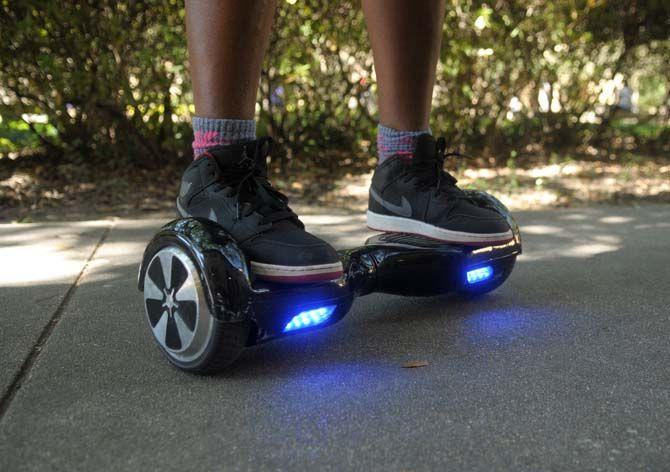LSU, along with other universities across the nation, banned the use and presence of self-balancing scooters, or “hoverboards,” from dorms and buildings on campus this semester.
This was the prudent and right decision. During Winter Break, videos circulated of these machines spontaneously catching fire.
A piece I wrote last semester details how a majority of the hoverboards sold in the United States are built with “weaker motors, not as reliable batteries, gyro boards, and improper motherboard design,” according to Wired.com. I was not surprised, and in fact, felt vindicated when NPR reported low-quality batteries are the key culprits behind self-balancing scooters #CatchingFire.
This battery issue is not trivial, and some regulatory officials are questioning whether to pull “hoverboards” off the market entirely.
The Federal Aviation Administration, the United Nations and the North American Transportation Services Association are all investigating the safety of transporting these second-tier lithium-ion batteries across the skies.
Governmental and safety experts fear self-balancing scooters could combust mid-air if cargo planes get too hot. In essence, transporting them through the skies could potentially be doing the Islamic State group’s work for them.
Charging these knock offs can lead to problems as well. Overcharging the substandard batteries in hoverboards can cause spontaneous fires to erupt.
Before #HoverSquad comes for my neck, it is important to note this is not the first time novel modes of transportation have elicited public pushback.
In 2013, the Boeing 787 Dreamliner ground to a halt after two of the model’s lithium-ion batteries caught fire, with one fire occurring mid-flight. Tesla, the premier electric car maker, issued an update to the car’s suspension after two fires occurred. The Economist reported the fires erupted once the lithium battery coverings are damaged by garden-variety road debris.
The manufacturers can and did resolve these issues. Therefore, there’s still hope for people who want their videos to go viral like Mike Tyson’s did on Christmas Day.
First, the companies selling these gizmos must stop overcharging for faulty products. They need to research and invest in the best batteries and parts to make these devices safe.
Secondly, consumers need to be more wary of who is endorsing and/or selling these products. Don’t buy something just because Kendall Jenner, Soulja Boy or Justin Bieber flaunt one on their Snapchat or Instagram.
Hopping on celebrity endorsed trends is a sure fire way to end up disappointed and quite possibly burned.
Finally, don’t be the guy or gal who sneaks around campus and zooms as they please. I won’t sympathize with you if your “board” explodes and damages property or injures people, and LSU should make you bear the costs of any damage attributed to your two-wheeler.
Garrett Hines is a 21-year-old political science senior from Monroe, Louisiana. You can reach him on Twitter @GarrettH_TDR.
Opinion: LSU made right decision banning hoverboards
January 12, 2016
Accounting sophomore Ebony Thomas’ self-balancing scooter.
More to Discover












